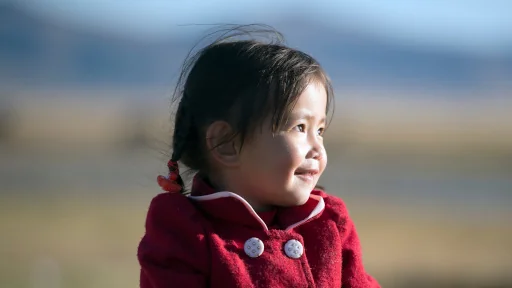Opinion Editorial Archive November, 2021: Full Circle

Most history books will teach you that Ferdinand Magellan was the first person to circumnavigate the world. They are wrong. It was actually Juan Sebastián Elcano — along with a few other surviving members of their expedition whose names are now lost in time. But that mistake doesn't matter. What does matter is what the history books won't tell you — because it is far more interesting and far more significant. The first person to circumnavigate the world was, in a more meaningful sense, this child. Such claims require strong evidence, of course, so let me present it.
She is an indigenous Kazakh girl whom I photographed in western Mongolia a few years ago. As she looked westward at the last setting sun before the onset of winter, she did not know that among her ancient ancestors were those who had looked at the same setting sun and, just like her, were inquisitive. Tens of thousands of years earlier, in the same part of the world where her ancient ancestors had lived, some of them were inquisitive enough to follow the sun and, thus, modern humans began migrating westward for the first time since our original ancestors had migrated out of Africa.
While most of her ancient ancestors remained in Central Asia, some of them carried her genetic ancestry east and others west. Those who journeyed east carried her genes into the Americas. Those who journeyed west carried them into Europe and, eventually, Greenland. We learned last month that it was exactly a thousand years ago that her genes had traveled full circle when a small group of Vikings became the first to cross the Atlantic Ocean from Greenland to North America. (Most history books will teach you that it was Christopher Columbus who first crossed the Atlantic Ocean 471 years later, but that mistake also doesn't matter.)
We can now consider some of last month's news stories from their true perspective.
Let's start with the UK. There, last month, a publisher was forced to withdraw a high school history text book. The book — an approved high school grade reference text on US history — asked students to consider the question: "To what extent do you believe the treatment of Native Americans has been exaggerated?" The same publisher has previously asked students to consider whether slavery in the US could be justified.
In the US itself it was Indigenous Peoples' Day last month. That same recognition still honors Columbus in Spain. (He was Italian by birth.) US President Biden had, correctly, pointed out that indigenous Americans were devastated by European colonization. In response, the leader of the right-wing political Spanish Popular Party maintained the historical falsehood that Spain had "...discovered the New World, [and] respected those who were there..." Of course, he did this on a social media platform that claims not to tolerate such verifiably untruthful posts.
Meanwhile, in China, President Xi included in a speech: "The historical task of the complete reunification of the motherland must be fulfilled, and will definitely be fulfilled." He was referring to the pending annexation of Taiwan by China. In case we need to be reminded, Germany annexed Austria in 1938, with Hitler using similar political rhetoric. It took a six-year war and millions of deaths before Austria became a sovereign nation again.
It would be wrong to think there was no conflict among societies during the tens of thousands of years that it took for us to first encircle the world. It stands to reason that conflict would have been one of the factors in the decisions of some groups to seek new territory. As they became more isolated from their ancestors their identity evolved. That is how the world came to have so many different languages, religions, rituals, sociologies etc. As the current situation in northern Ethiopia shows us, different indigenous societies can still be conflicted in the region where they have lived for thousands of years.
There was certainly conflict among colonizing societies when we encircled the world for the second time. But the context was entirely different. Most European colonizers transported their own conflict and imposed it on indigenous peoples because of greed, in the name of religion and with a prejudiced opinion of their own superiority. Anyone who doesn't know this should not be a contributor to a history text, a political party leader or a president.
Perhaps we traveled around the world as well as any species could have the first time. If last month's events show us anything, it is that the second time we did it we set ourselves on a course that will be irreversible if we fail to learn the lessons of true history.
Short documentary films, and a full-length one, about the Kazakh people are available on our YouTube channel.
If you enjoyed reading this month's opinion editorial, please consider supporting independent, advertising-free journalism by buying us a coffee to help us cover the cost of hosting our web site. Please click on the link or scan the QR code. Thanks!

